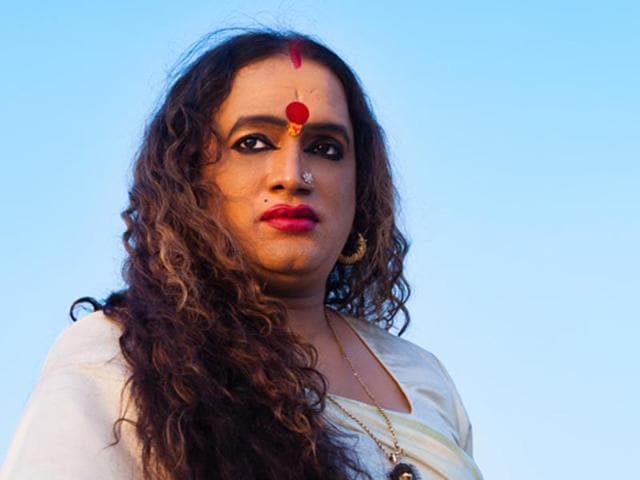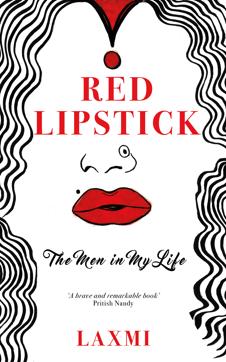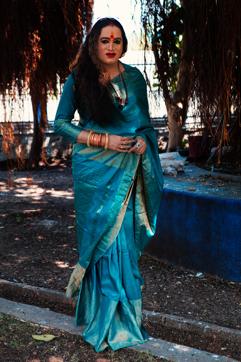My sexuality is only mine, I felt I should explore it: Laxmi Narayan Tripathi
A transgender activist, Laxmi Narayan Tripathi, recently came up with her latest book Red Lipstick, where she explores her sexuality and philosophy through real life incidents.
“A boy myself, I asked him why I liked men’s crotches,” young Laxmi Narayan Tripathi, often wondered. In the book Red Lipstick, Laxmi bares herself open — in her inimitable and unapologetic voice. The book, co-authored by Pooja Pande, narrates the story of Laxmi’s life; doles out interesting anecdotes and thought provoking one liners. “Gender is nothing but an unromantic box”, she asserts.

The book from Penguin Random House India gives us a peek into the circumstances that forced Laxmi to become a transgender rights activist as we know her today. And that’s achieved through the stories of men who affected her. From her supporting father who announced on TV that it was none of his business to interfere in his grown up son’s personal life, to the relative who sexually harassed her when she was a 7-year-old, the book features many men who created, supported or abused her. Laxmi is also the first transgender to have represented Asia Pacific in the UN. Excerpts:

What was the idea behind your book which also discusses men in your life?
The idea of the book came in 2012, when I was first editing my first autobiography ‘Me Hijra Me Laxmi’ in Marathi, which was then translated into Gujarati, English and Hindi. And I thought why not discuss about the men in detail, as it’s always good to discuss about them, right? My sexuality is only mine and I felt I should explore it and in that process I have explored it fully.
Many avoid using the term ‘hijra’ for transgenders. However, you use the word to talk about your gender.
The word Hijra is derived from word “Hijr’ which means a journey to find one’s true self. So this whole process which I went through from self discovering myself to self recognition and fighting for my gender identity. The word transgender is inadequate, especially in Indian context as Kinnar or Hijra has been part of our history and ancient text like Ramayana , Mahabharata and others. The Hijra or the Kinnar is a community that follows the ‘Guru Chela’ parampara, and has certain rules, rituals and customs.
Why do you think women are discouraged from talking about their sexuality or desires?
Sexuality was never a taboo in India, we have a very rich history of women who used their sexuality for their best interest — be it the apsaras in Vedas or Draupadi in Mahabhartha, Sita in Ramayana, all were women of substance. It was only after the colonial rule that such morals became a part of our society, they wanted women to be limited to kitchens but now things are changing a bit. Be it Amarapali or Rani Lakshmi Bai both had their own say, so I feel it’s the patriarchy which limits the women from expressing themselves.

What are two of your top most struggles as a transgender?
My self acceptance about my sexuality; my community’s recognition by Supreme Court of India.
Your story about your father’s acceptance of your choice to live as a transgender is inspiring. He not only accepted you as a transgender but also told you to dress up (in a saree) at home, if you so wished. This acceptance is still rare.
My father is a true man because he accepted me as I am and supported me in my fight.
Your account of being a victim of child sexual abuse at the tender age of seven by your relative is heart wrenching. How difficult was it to write about it and did you manage to overcome the emotional scars the incident left behind?
It can never be easy… it does bring back those traumatic feelings and I didn’t know what to do about it. I was naïve and I lost my innocence in a way.
You have also spoken about men who approach you for sex yet they call themselves heterosexual.
Come on, we all know that sexuality is fluid. Sex is different from sexuality and one needs to find and explore their sexuality. I won’t agree to the term that sexuality is a taboo in India, since ancient times sexuality was appreciated and been in there in Indian history since puranas or vedic times because there is quote in Manu Smriti which says ‘Vikhurthi evam Prakruthi’ people accepted sexuality in ancient times but after colonisation, we were forced upon by western culture which looked upon as part of decent behaviour or rather their moralistic view. I would rather say we should go back to our culture, rediscover ourselves and not get shackled in the set norms of society. By this book, I have attempted to give the youth some insight on self exploration and also help them understand their sexuality.





